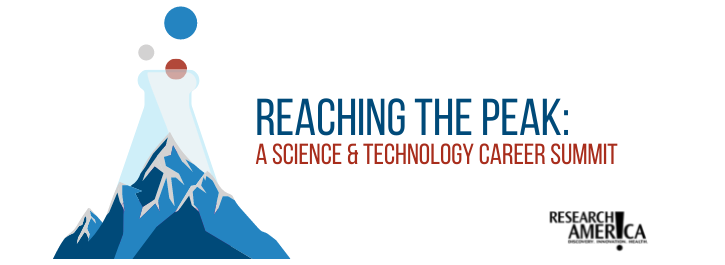Highlights of the 2022 Early Career Summit

Research!America’s second annual Early Career Summit, “Reaching the Peak,” held virtually on June 15, featured a variety of panelists, speakers, and workshop leaders who spoke to attendees on topics ranging from science startups to civic engagement.
The day began with a career panel discussion with eight speakers from across the public and private sector health, science, and research ecosystem. Panelists spoke about their own experiences and described their career paths. One of the speakers, Taylor Winkleman-Cagle, shared her non-traditional career path. She became an Arabic linguist for the U.S. Army, later earned her Doctor of Veterinary Medicine degree and practiced as a veterinarian, and now works on U.S. space policy. She embodies the statements that “no two career paths are the same” and that “science can take you anywhere!”
Following a short break for virtual networking, where attendees were able to utilize A.I. matchmaking features to network with each other, we held a series of workshops aimed at enabling attendees to hone skills that can be used in a wide range of careers, as well as in civic engagement.
John Siniff, former opinion editor at USA Today, spoke about opinion piece writing, including how to capture readers’ attention, how to choose a topic to respond to, and how to build relationships with editors. He emphasized the need for diverse, smart, reflective, research-astute voices in opinion piece writing, and he encouraged scientists not to be intimidated by the process, but instead to speak about topics that move them and with which they are deeply familiar.
We also heard from Jena Barchas-Lichtenstein, PhD, Media Research Lead at Knology, on how to craft the perfect elevator pitch for specific audience. Attendees were able to develop, practice, and adapt a pitch crafted for a scientific audience not familiar with their research or for a non-science audience.
Next, in a very popular segment, science communicator and social media influencer Samantha Yammine, PhD, aka “Science Sam” (Twitter, Instagram), spoke about social media best practices for science communication, including on Twitter, Instagram, and TikTok.
Following the workshops, attendees had the option of three concurrent breakout sessions:
- The first session, Scientists and Startups, was led by Derek Rapp, a Research!America board member and Managing Director at Rivervest Venture Partners. He discussed the synergies between science and entrepreneurism, the types of information it is best to include in a presentation to potential investors, and factors to consider when thinking about entering the research startup space, and he gave advice to those considering starting a company based on their research.
- The second session featured two recipients of Research!America’s Civic Engagement Microgrant program, which awards grants to early career researchers focused on science policy and communication. Maria Newhart, PhD, and Rolando Trejos Saucedo spoke about how to start a science policy group on campus and how to generate and execute advocacy ideas.
- The third session, led by Josh Henkin, Founder of STEM Career Services, focused on developing a strong LinkedIn profile and on how to use LinkedIn to network effectively.
The next discussion, focused on mentorship, was moderated by Jasmine George, PhD, Research!America’s Dr. Louis Sullivan Science Policy Fellow. The panel included Joel Beetsch, PhD, a corporate affairs executive in the biopharmaceutical industry; Sophia Kaska, PhD, Research!America’s Manager of Science Initiatives and Outreach; and Marsha Walkup, PhD, senior director of the Gastroenterology Field Team at Takeda. They discussed the “What, Why, and How of Mentorship,” including the benefits and challenges of finding the most suitable mentor. The panelists discussed the importance of a mentor to professional development and gave advice on finding a mentor and developing a solid bond with them.
To round out the event, Summit attendees and speakers participated in a virtual networking reception with members of Research!America’s Board of Directors and staff. The reception featured themed breakout rooms focused on a variety of topics ranging from “What I Wish I Knew When I Started My Career” to “Science Communication and Media.”
Thank you to all the panelists, speakers, and early career researchers who joined us. The Summit was made possible by the generous support of principal sponsor Pfizer, and event sponsors Elsevier, the Rita Allen Foundation, Takeda, and Hermine Warren.




